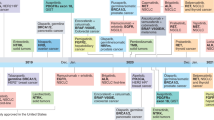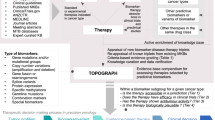Abstract
Implementing personalized cancer care requires a sound understanding of cancer genomics, familiarity with the analytical methods used to study cancer, knowledge of the mechanisms of action of targeted drugs, and ways to assimilate and understand complex data sets. Perhaps the greatest challenge is obtaining the drugs predicted to be beneficial based on the genomic profile of a patient's tumour. A potential solution is creation of a national facilitated access programme and registry for off-label use of targeted anti-cancer drugs. Within such a programme, patients could receive the targeted agent matched to the genomic profile of their tumour. Physicians would receive guidance in interpretation of complex genomic tests and access to drugs. Pharmaceutical companies, payers and regulators would receive data on off-label drug and test use and clinical outcomes to inform their research and development plans and coverage decisions and to track real-world safety. Although recently launched prospective clinical trials will determine the true benefit of matching drugs to genomic alterations, the approach proposed here will facilitate delivery of personalized medicine services to participating patients while at the same time making observations that allow us to learn from each patient to inform clinical care and future research initiatives.
This is a preview of subscription content, access via your institution
Access options
Subscribe to this journal
Receive 12 print issues and online access
$209.00 per year
only $17.42 per issue
Buy this article
- Purchase on Springer Link
- Instant access to full article PDF
Prices may be subject to local taxes which are calculated during checkout

Similar content being viewed by others
References
Garraway, L. A. Genomics-driven oncology: framework for an emerging paradigm. J. Clin. Oncol. 31, 1806–1814 (2013).
MacConaill, L. E. & Garraway, L. A. Clinical implications of the cancer genome. J. Clin. Oncol. 28, 5219–5228 (2010).
Tsimberidou, A. M. et al. Personalized medicine in a phase I clinical trials program: The MD Anderson Cancer Center Initiative. Clin. Cancer Res. 18, 6373–6383 (2012).
Arnedos, M. et al. Array CGH and PIK3CA/AKT1 mutations to drive patients to specific targeted agents: A clinical experience in 108 patients with metastatic breast cancer. Eur. J. Cancer 48, 2293–2299 (2012).
Andre, F. et al. Comparative genomic hybridization array and DNA sequencing to direct treatment of metastatic breast cancer: a multicenter, prospective study (SAFIR01/UNICANCER). Lancet Oncol. 15, 267–274 (2014)
Hollebeque, A. et al. Molecular screening for cancer treatment optimization (MOSCATO 01): A prospective molecular triage trial—Interim results [abstract]. J. Clin. Oncol. 31 (Suppl.), a2512 (2013).
Iyer, G. et al. Genome sequencing identifies a basis for everolimus sensitivity. Science 338, 221 (2012).
National Cancer Institute. Best Practices for biospecimen resources [online], (2007).
Deverka, P., Messner, D. & Dutta, T. Effectiveness guidance document: Evaluation of clinical validity and clinical utility of actionable molecular diagnostic tests in adult oncology [online], (2013).
Teutsch, S. M. et al. The evaluation of genomicapplications in practice and prevention (EGAPP) initiative: methods of the EGAPP Working Group. Genet. Med. 11, 3–14 (2009).
Hammond, M. E. H. et al. American Society of Clinical Oncology/College of American Pathologists guideline recommendations for immunohistochemical testing of estrogen and progesterone receptors in breast cancer. J. Clin. Oncol. 28, 2784–2795 (2010).
Wolff, A. C. et al. Recommendations for human epidermal growth factor receptor 2 testing in breast cancer: American Society of Clinical Oncology/College of American Pathologists Clinical Practice Guideline Update. J. Clin. Oncol. 31, 3997–4013 (2013).
Lindeman, N. I. et al. Molecular testing guideline for selection of lung cancer patients for EGFR and ALK tyrosine kinase inhibitors: Guideline from the College of American Pathologists, International Association for the Study of Lung Cancer, Association of Molecular Pathology. J. Thorac. Oncol. 8, 823–859 (2013).
Micheel, C. M., Nass, S. J. & Omenn, G. S. (Eds) Evolution of Translational Omics: Lessons Learned and the Path Forward (The National Academies Press, 2012).
McShane, L. M. et al. Criteria for the use of omics-based predictors in clinical trials. Nature 502, 317–320 (2013).
Meric-Bernstam, F., Farhangfar, C., Mendelsohn, J. & Mills, G. B. Building a personalized medicine infrastructure at a major cancer center. J. Clin. Oncol. 31, 1849–1857 (2013).
Van Allen, E. M., Wagle, N. & Levy, M. A. Clinical analysis and interpretation of cancer genome data. J. Clin. Oncol. 31, 1825–1833 (2013).
My Cancer Genome. Anticancer agents [online], (2014).
Von Hoff, D. D. et al. Pilot study using molecular profiling of patients' tumors to find potential targets and select treatments for their refractory cancers. J. Clin. Oncol. 28, 4877–4883 (2010).
MacConaill, L. E. et al. Profiling critical cancer gene mutations in clinical tumor samples. PLoS ONE 4, e7887 (2009).
Iyer, G. et al. Prevalence and co-occurrence of actionable genomic alterations in high-grade bladder cancer. J. Clin. Oncol. 31, 3133–3140 (2013).
Tran, B. et al. Cancer genomics: technology, discovery and translation. J. Clin. Oncol. 30, 647–660 (2012).
Hillner, B. E. et al. Impact of Positron Emission Tomography/Computed Tomography and Positron Emission Tomography (PET) alone on expected management of patients with cancer: initial results from the National Oncologic PET Registry. J. Clin. Oncol. 26, 2155–2161 (2008).
Center for Medicare and Medicaid Services. Proposed decision memo for Positron Emission Tomography (FDG) for solid tumors (CAG-00181R4) [online], (2013).
Conley, B. A. Precision cancer medicine exceptional responders NCI-MATCH [online], (2014).
Simon, R. Optimal two stage designs for phase II clinical trials. Control. Clin. Trials 10, 1–10 (1989).
US National Library of Medicine. ClinicalTrials.gov [online], (2014).
Friends of Cancer Research. Lung cancer master protocol activation announcement [online], (2013).
Author information
Authors and Affiliations
Corresponding author
Ethics declarations
Competing interests
The author declares no competing financial interests.
PowerPoint slides
Rights and permissions
About this article
Cite this article
Schilsky, R. Implementing personalized cancer care. Nat Rev Clin Oncol 11, 432–438 (2014). https://doi.org/10.1038/nrclinonc.2014.54
Published:
Issue Date:
DOI: https://doi.org/10.1038/nrclinonc.2014.54



